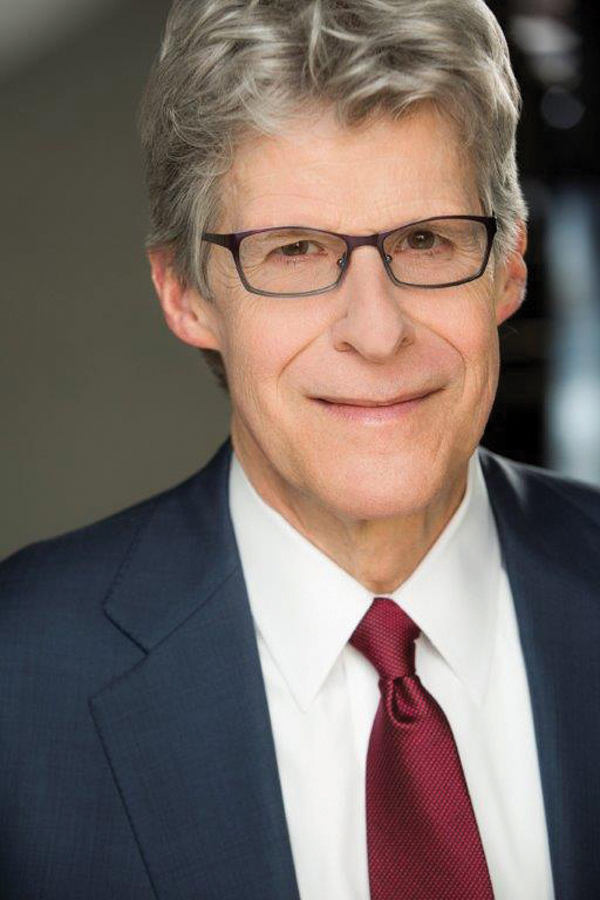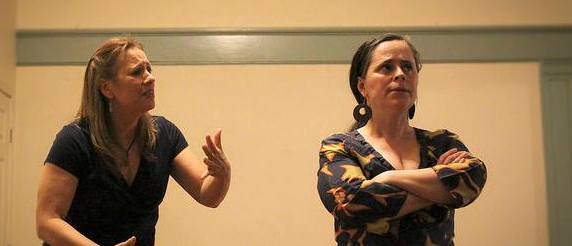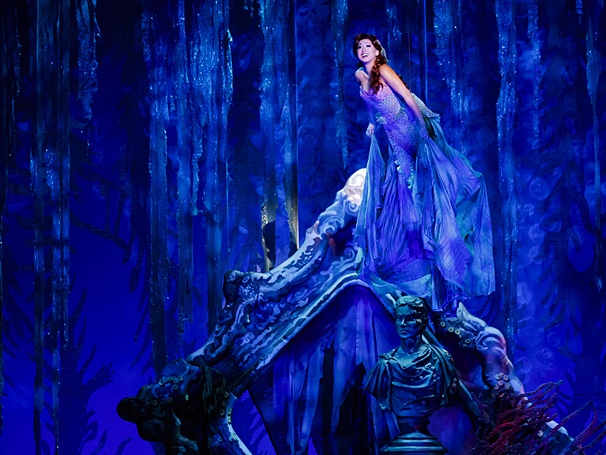Interview with Ted Chapin of the Rodgers & Hammerstein Organization
By Scott Dowd
Entire contents copyright © 2016 Fearless Designs. All rights reserved.
It’s a 53-year-old film and I would challenge you to find three American adults who couldn’t at least hum the main tune. Julie Andrews’ iconic twirl through the mountains is…well, iconic! So why is Theodore S. “Ted” Chapin, who created and leads The Rodgers & Hammerstein Organization, so excited about the new stage production of The Sound of Music? That is one of the questions I asked him during our recent telephone conversation. I was also interested to find out how he came to find himself in such a unique job. Mr. Chapin is a member of some of New York’s oldest families. A fun fact to which Ted never alluded during our conversation is that his father, Schuyler Chapin, who served as Commissioner of Cultural Affairs for New York City in the 1990s, is the third cousin sixth removed of Elizabeth “Betsy” (Schuyler), wife of first U.S. Treasury Secretary Alexander Hamilton. In light of the phenomenal popularity of the current musical based on Hamilton’s life—I found that tidbit quite fascinating!
Ted Chapin: When Richard Rodgers and Oscar Hammerstein were first put together to write a musical based on a moderately successful play that the theatre guild had done, Green Grow the Lilacs, they were both still paired with other people. Rodgers partnered with Hart and Hammerstein, but mostly with Kern. But neither Kern nor Hart was interested in Green Grow the Lilacs, so it became a project for one-half of two teams creating this one-off show. The fact that the show became Oklahoma! suddenly—as if it had been preordained—this team that was clearly good, clearly liked working together, clearly believed in the same kind of theatre, sprang forth fully formed, so to speak.
Scott Dowd: Both men were both known quantities, so little surprise there!
TC: Both had worked in the musical theatre for many years, it’s true, but their understanding of the business aspect of the theatre and how it worked was unique. With their advisors (Wouldn’t I have loved to be a fly on that wall?), they said, “You know what? Let’s control our own destiny.” So from that moment until Oscar Hammerstein died in 1960, they were their own music publishers, they were their own producers, they did any and all licensing of their shows and they even produced some movie versions of their work. They were men who clearly had extraordinary confidence in their abilities.
SD: How did you come to be involved with their work?
TC: The year after Richard Rodgers died, I got a call from his daughter, Mary Rodgers. She said, “I think they could use you at the Rodgers & Hammerstein office. Here’s the number. Give them a call.” That was thirty-three years ago and I keep telling people, “You never know what’s going to happen in life—be open for the surprise.”
SD: It’s hard to imagine how you prepare for a job like that!
TC: Most people say: “You have the coolest job in the world” without having a clue what it is. I have a kind of eclectic background. Growing up in New York, I knew I wanted to be involved with theatre, but I didn’t want to be an actor. Becoming a production assistant on shows was a very good way to spend summer months, so I talked my way into being a production assistant on Follies and kept a journal.
SD: What made you keep a journal?
TC: I was in college at the time and wanted course credit. That worked fine, and thirty years later—because it was Follies—an opportunity came to write it as a book. Everything Was Possible was published by Knopf in 2013. It was an interesting time, filled with incredible people like Hal Prince, Stephen Sondheim, Michael Bennett, Yvonne De Carlo, Boris Aronson and Alexis Smith. For a Connecticut College student, it was an incredible experience. It prepared me to later run the Musical Theatre Lab, which was the first of the not-for-profit developmental organizations for new musical theatre. Mary Rodgers knew my work because she was friends with my parents and she had also seen the work I had done in the Musical Theatre Lab. She knew my interest in new musicals and had seen my work on other shows. She did point out to me that the decision was made by her mother and Bill Hammerstein who had had a couple of ideas that didn’t work, and she said, “When they finally let me have something to say, I asked, ‘What about Schuyler and Betty’s son Ted; he seems to make creative things happen.’” They had no idea what they wanted or needed—I had no idea what the job was, but it just worked. My learning curve paralleled the learning curve of the members of the family who were responsible. It was kind of ideal.
SD: The time frame for this was 1980?
TC: Yes. Yul Brenner was touring the country in a rather tatty production of The King and I but making a lot of money for everybody. The challenge was, “Okay, when this is over, are there any other Rodgers & Hammerstein shows that people are going to want to see on Broadway?” It was a wonderful challenge. As long as there was a combination of patience and good ideas, we could see the Carousel that Nick Hytner did at the National Theatre; we could see The King and I that was done in Australia. We just wanted to keep the shows out there. And because there are enough of them, you can respect the cycles.
SD: How many projects are you working on right now?
TC: That’s a hard one, because there are so many in different stages. The King and I played in Lincoln Center last summer and in October the tour opened in Providence, Rhode Island. The tour of The Sound of Music that is coming to Louisville has been on the road for a year. There is a Cinderella tour and there are a couple of new ideas in development. There is always something going on, and we don’t hit it out of the ballpark every time; but I think we’ve done pretty well and I’ve had a really good time in the years I’ve been there.
SD: You’ve taken some chances as well that have been culturally significant—like the all African American casting for Cinderella—and earned some recognition for that.
TC: Thank you. A lot of those are judgment calls. When NBC approached us about doing the live production of The Sound of Music with Carrie Underwood, it was a bit of a risk. Bob Wright, head of the network, said, “The only thing that I know I can get eyeballs on are live events—sports, games, award shows—and I want to try to do that with entertainment.” He said he wanted to do a musical and he wanted to do The Sound of Music. I said, “Okay.”
SD: You sound like you might have had some reservations.
TC: I have to say there was a moment the day before it happened, when I thought, “Gosh. If people don’t watch this, I don’t want The Sound of Music to get a black eye.” Then, of course, the ratings were three times what anybody had predicted. It was a major event. One of the interesting things I found out about television that night was that viewership did not drop off after three hours. That was astonishing and it shows me that there is still life in these properties. People are still interested in them!

Cast of the National Company of The Sound of Music. Photo by Matthew Murphy
SD: When The Sound of Music first came to the stage in 1959, it was still living memory. Many, if not most of the audience, had lived through World War II and the years leading up to it. What keeps this play current and alive for audiences more than five and a half decades later?
TC: First of all, I love that you say that about The Sound of Music because it’s something a lot of people overlook. There was a time where I said it was kind of like a 9/11 musical—which is actually opening next year—but a big, splashy Broadway musical about something that happened in recent history was pretty ghastly and a bold thing to do. What I have come to realize and respect is this is an extraordinarily well-crafted piece of theatre. The story is good, the music is good and it has an emotional honesty that engages people. They may even shed a tear or two. I think that’s what makes good theatre, period.
SD: Certainly the relationship between Liesl and Rolf is something everyone goes through, in their own way. It’s part of growing up.
TC: There are three women in this show and again—this is so typical of Rodgers & Hammerstein—they are each at a different place in their lives. Obviously, the one in the middle, Maria, is the one who is in the biggest transition, so the story revolves around her. But we also have Liesl, the teenager just dealing with becoming a woman who looks slightly askance at Maria in the beginning when she says, “I don’t need a governess.” Contrast that with the later scene when she lets her into the bedroom and says, “Maybe I was wrong about that.” After Rolf goes to the dark side and Maria, now her stepmother, sings the reprise of “I am sixteen going on seventeen,” she is saying in effect, “I have learned, and you will learn as well.” It is a beautiful narrative arc. With the Mother Abbess, there has been a tendency to hire a slightly over the hill mezzo-soprano. But if you make her younger—just a little older than Maria—she becomes a woman who has come to terms with her decisions in life. What Director Jack O’Brien has done with this production is really astonishing. There was a review of the show a couple of weeks ago that I just loved. The reviewer said, “What Jack O’Brien has done with this show is like a watchmaker taking a 75-year-old watch, taking it apart, cleaning the gears and making a watch that looks brand new.”
SD: You have a real newcomer in Kirsten Anderson as Maria. The pairing with a Broadway veteran like Ben Davis mirrors the relationship between Maria and the Captain.
TC: Yes. She’s wonderful. Kirsten is from Vermont, so she instinctively has an affinity with the outdoors and mountains. When she was cast, she was a sophomore at Pace University. She has been at this for a year, and every performance I see is as good as the last one! Maintaining your performance is a tricky thing.
SD: It’s a difficult skill that usually takes time to master. Doing a road show is not the same as performing a sit-down show.
TC: Absolutely. And I have to say of this company, they really enjoy each other. There is always such confidence and good spirit among them.
SD: What would you like audiences to take away from an evening at The Sound of Music?
TC: If you’ve never seen The Sound of Music, you’re in for a treat. If you know The Sound of Music, you’re in for a slightly different treat because there are surprises to be found in familiar territory. It is so well done and the story is so well told that you can’t help but be captivated by the essence and the best of what American musical theatre is all about. It might sound like a cliché, but I’ve been involved with other productions that I wouldn’t say that about. But this has really been a joy. It’s a great, great evening in the theatre.
The PNC Broadway in Louisville presentation of The Sound of Music runs January 17 through 22, 2017, in Whitney Hall at The Kentucky Center for the Arts. For tickets and more information, call 502.584.7777 or go to kentuckycenter.org.
 Scott Dowd has a wealth of experience working within and commenting upon the arts scene in Louisville. He has been involved with Kentucky Opera, the Louisville Orchestra, and Louisville Public Media. His talents and experience include: Actor; Director; Singer; Musician; Radio and Television Interviewer; Classical and News Jock; Public Speaking; Public Relations; Marketing; Development; Writer; Substantive Editor. He currently serves on the Board for Arts-Louisville.com.
Scott Dowd has a wealth of experience working within and commenting upon the arts scene in Louisville. He has been involved with Kentucky Opera, the Louisville Orchestra, and Louisville Public Media. His talents and experience include: Actor; Director; Singer; Musician; Radio and Television Interviewer; Classical and News Jock; Public Speaking; Public Relations; Marketing; Development; Writer; Substantive Editor. He currently serves on the Board for Arts-Louisville.com.





